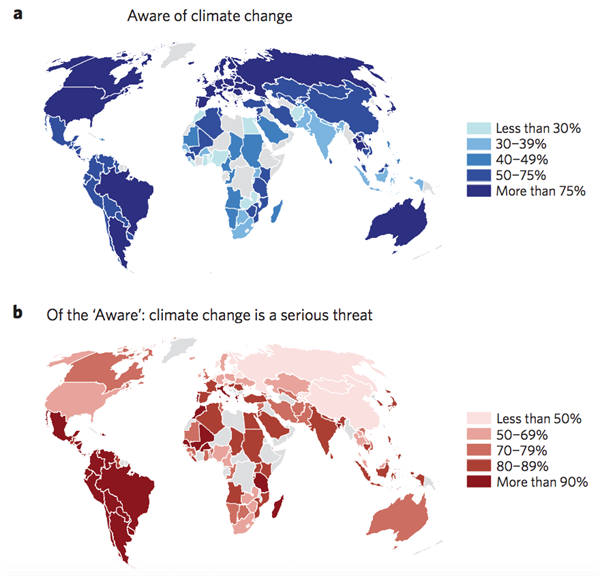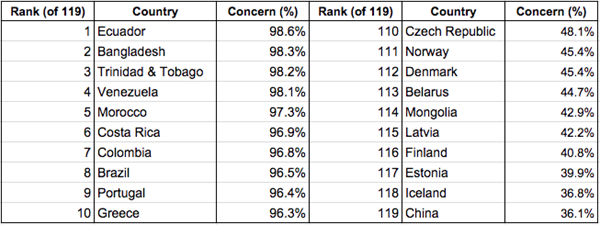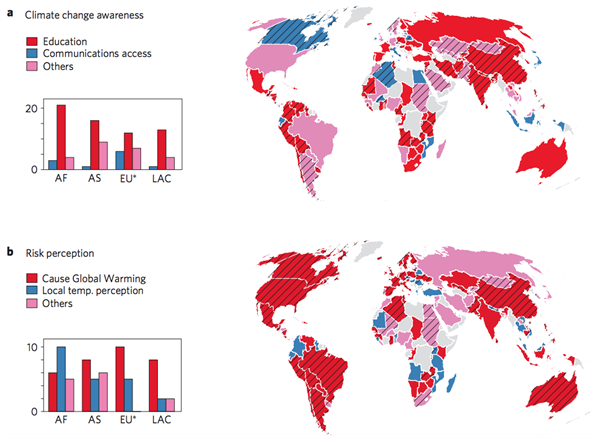Analysis of a global survey finds that more than a third of the world’s adults have never heard of climate change. For some countries, such as South Africa, Bangladesh and Nigeria, this rises to more than two-thirds of the adult population.
The study says that education is the “single strongest predictor” of public awareness of climate change. Improving basic education and public understanding of climate change are vital to garner support for climate action, the researchers add.
Awareness and concern
The new study, published in Nature Climate Change, uses the results of a Gallup World Poll in 2007-08, which collected responses in 119 countries. This is the largest survey ever conducted on climate change, the paper’s authors tell Carbon Brief, representing more than 90% of the world’s population.
The poll asked people: “How much do you know about global warming or climate change?” Those who were aware of the issue were then asked the follow-up question: “How serious a threat is global warming to you and your family?”
The results show that adults in developed countries were more likely to say they are aware of climate change. Awareness rates in much of North America and Europe were well over 90% of respondents. Japan comes top with 99% of the population aware of climate change, with the US (98%) and Finland (98%) following closely behind.

Percentage of respondents saying they were aware of climate change: top and bottom 10 countries. Data source: Lee et al. (2015)
In contrast, awareness rates in developing countries were much lower. For example, 47% of respondents in Philippines said they were aware of climate change, while this was 35% for India and 25% for Egypt. The lowest levels of awareness were recorded for Liberia at just 21%. You can see these patterns in the upper map below.

Global geographic patterns of climate change perception, for a) awareness, and b) concern. Darker shading shows countries where respondents were more aware or concerned. Light grey indicates countries with no data. Source: Lee et al. (2015)
But though awareness seems to be lower in developing countries, when people said they were aware of climate change, they tended to be very concerned about it.
As you can see in the lower map above, respondents saying that climate change is a serious threat is very high in South America and in many African and Asian countries. The highest proportion of respondents concerned were found in Ecuador (99%), Bangladesh (98%) and Trinidad and Tobago (98%).
Concern in western countries such as the US (64%), Germany (65%) and the UK (71%) is much lower than their awareness, while the countries who least considered climate change a threat were China (36%), Iceland (37%) and Estonia (39%).

Percentage of respondents saying they considered climate change a serious threat: top and bottom 10 countries. Data source: Lee et al. (2015)
Education, education, education
The researchers attempted to get to the bottom of why awareness and concern of climate change differs between countries. They analysed the responses against social, financial and behavioural factors to see if they were linked, such as age, education level, urban or rural location, income, access to communications, and engagement on civic and environmental matters.
The results suggest respondents with a higher level of education were more likely to be aware of climate change. You can see this in the upper map below. Countries shaded red are those where education level was the main predictor of awareness.
Blue shading shows countries where access to communications was the main factor, and pink shading indicates it was one of the many other factors the study considered. This could be income, for example, which was the top predictor in seven countries, with higher earning respondents more likely to be aware of climate change.
Education is less of a factor in whether respondents consider climate change a threat, the researchers say. Instead, they find the principal factor is, unsurprisingly perhaps, whether respondents consider climate change to be human-caused. These countries are shaded red in the lower map below where this was the main factor.
Experiencing temperature changes in their local area was found to be the most important factor in many African and Asian countries (blue shading).

The factor most strongly linked to a) awareness and b) concern about climate change. Hatching indicates countries where the top factor was substantially more influential than the second-ranked one. Light grey indicates countries with no data. Bar charts show average results for Africa (AF), Asia (AS), Europe, North America and Australia (EU), and Latin America and the Caribbean (LAC). Source: Lee et al. (2015)
The poll results suggest these factors are linked to climate change awareness and concern, but they don’t prove for certain that they cause it, authors Dr Tien Ming Lee from Columbia University and Dr Anthony Leiserowitz from the Yale School of Forestry and Environmental Studies note. They tell Carbon Brief:
“You need experimental data to prove the role of a particular factor. But the relationship makes a lot of intuitive sense – if you lack education or literacy, it’s very hard to participate in or follow a global discourse about a problem that is often described in the language of science and global politics.”
Underlying causes
Based on these results, the researchers conclude that as people become more educated and begin to experience more unusual weather patterns, awareness and concern of climate change is likely to increase around the world.
Promoting education would help speed up this process, the paper says:
“Thus, investing in primary and secondary education may be an effective tool to increase awareness and risk perceptions of climate change.”
But finding that perception of the causes of climate change is a strong indicator of whether someone considers it a threat suggests other underlying causes, says polling analyst Leo Barasi.
“Saying that understanding of the causes of climate change is the strongest predictor of concern seems trivial and begs for other variables. What determines understanding of the causes?”
This isn’t a question the study can answer from the poll data, say Lee and Leiserowitz. But they tell Carbon Brief that the media is likely to play a prominent role:
“It is reasonable to assume that it will be at least partly shaped by access to media, and the quality of media coverage in each respective country. If the news sources you pay attention to don’t report the issue at all, or don’t explain the causes, it’s unlikely most people will get the information from other sources.”
There may be other important factors that the poll didn’t question people on, Lee and Leiserowitz say, such as political leaning. Other studies have shown respondents’ political views influence concern about climate change – particularly in the US, Canada, Australia and the UK. But as politics can be very different between countries, the researchers need data in order to find a link that is common around the world.
While no survey can cover every variable, the study assesses a remarkable number of factors, Lee and Leiserowitz say – many of which have never been tested before in connection with climate change.
Lee, T. M. et al. (2015) Predictors of public climate change awareness and risk perception around the world, Nature Climate Change, doi:10.1038/nclimate2728
Tags |